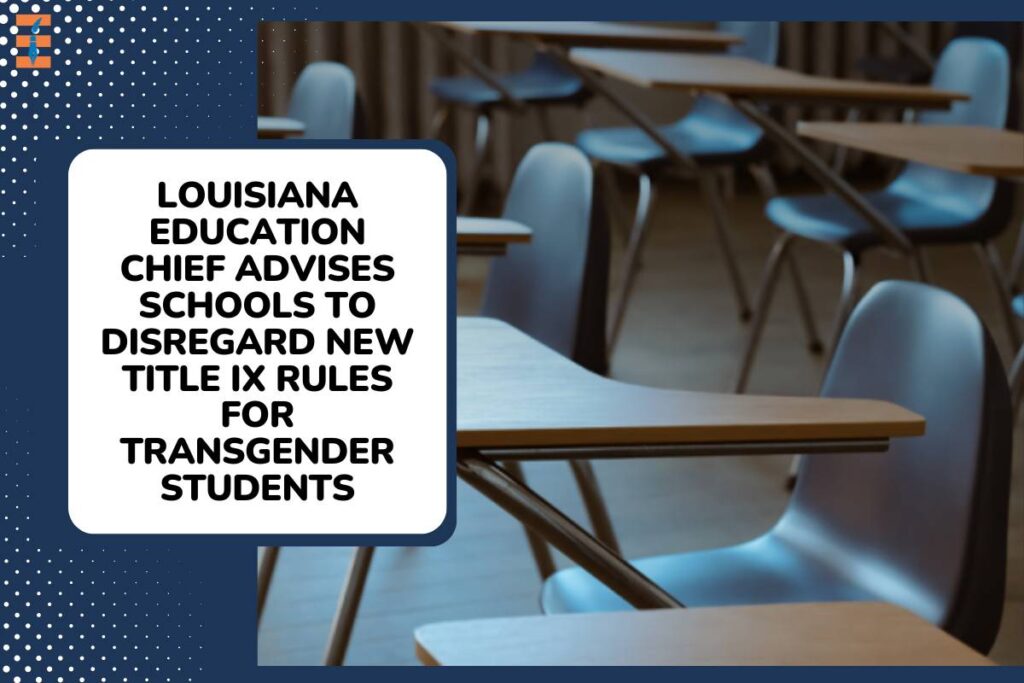South- Yahoo News Canada
Louisiana’s top education official, Cade Brumley, has issued a directive urging schools in the state to disregard the new Title IX rules proposed by the Biden administration, citing potential conflicts with existing state and federal laws. The recent changes to Title IX, a law aimed at preventing sex-based discrimination in federally funded educational institutions, include expanded protections for transgender students based on sexual orientation and gender identity, which have sparked controversy and criticism, particularly from Republican circles.
In a letter addressed to school system leaders and board members, Brumley highlighted concerns regarding the compatibility of the new Title IX regulations with Louisiana state laws. Specifically, he pointed out a state law from 2022 that prohibits transgender student-athletes from participating in sports teams aligned with their gender identity, suggesting that the federal rules could clash with this existing legislation.
The Biden administration’s updated Title IX rules, slated to come into effect on August 1, have faced opposition from several Republican lawmakers who view the transgender student protections as infringing on women’s rights. Brumley’s stance aligns with this sentiment, indicating a broader resistance from conservative quarters against federal interventions in state-level policies.
Brumley expressed apprehension that the forthcoming federal rules might also impinge on individuals’ First Amendment rights by mandating the use of transgender students’ preferred names and pronouns. Legislative proposals in Louisiana have echoed these concerns, with bills aiming to restrict school staff from using such identifiers without parental consent, and even proposing restroom and locker room usage based on biological sex rather than gender identity.
Navigating the Clash Between Federal and State Laws on Title IX
The potential clash between federal and state laws has raised legal uncertainties, with Brumley advising schools against immediate policy adjustments pending legal clarity. He anticipates legal challenges and court battles over the new Title IX rules, echoing sentiments from conservative organizations such as the Alliance Defending Freedom, which have threatened legal action against the Biden administration’s changes.
Louisiana is not alone in its resistance to the federal changes to Title IX. Similar directives to ignore the proposed rules have been issued in other states, including Florida, reflecting a broader political divide on issues related to gender identity and LGBTQ+ rights. Republican governors have collectively criticized the Biden administration’s move as governmental overreach, emphasizing states’ rights in education policy matters.
Navigating the Intersection of Civil Rights and State Authority
The ongoing debate underscores broader societal shifts and ideological divisions regarding gender identity, civil rights, and the role of government in regulating educational institutions. As the Biden administration moves forward with implementing the new Title IX rules, legal battles and political tensions are expected to intensify, with states like Louisiana actively exploring legal avenues to challenge federal mandates they view as conflicting with state laws and principles.
The Education Department has yet to respond to Brumley’s letter, signaling ongoing dialogue and potential conflicts between federal and state authorities on the interpretation and enforcement of Title IX rules about transgender student rights. These developments highlight the complexities and contentious nature of balancing civil rights protections with state sovereignty and individual freedoms in the realm of education policy.
Also Read: BBC Invests £6 Million in AI to Revolutionize Educational Services










